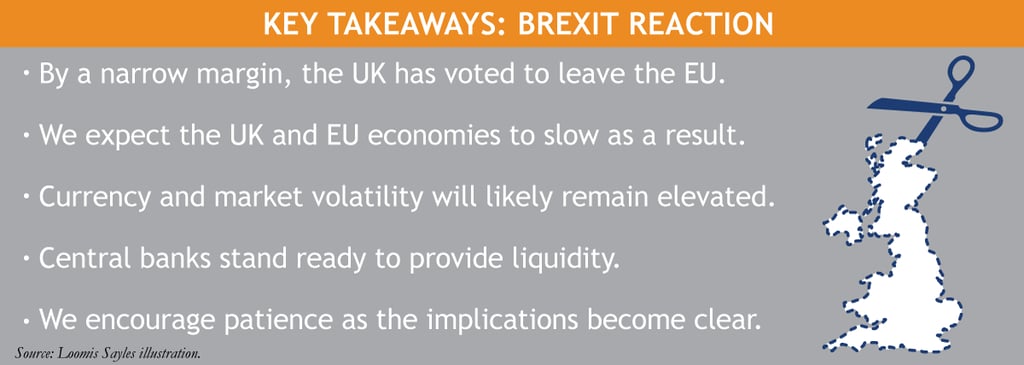Thus far, financial markets have not shown widespread panic over the historic outcome of last week's European Union (EU) referendum, just weakness and increased volatility. Here some initial thoughts on the economic and financial impact of this historic vote:

Concerns for the European Periphery
Uncertainty caused by Brexit will hit EU growth. Peripheral economies will remain pressured, and we expect intra-EU government bond spreads to widen. The European Central Bank (ECB) will seek to protect and defend the financial system and also stands ready to provide additional liquidity if needed. Brexit could spark political and referendum contagion across the euro zone, which could increase downside risks. For example, Scottish First Minister Sturgeon has announced her intention to propose a new independence referendum. The Spanish elections on Sunday, June 26 ended in another stalemate, which could result in a weak coalition government and continued political uncertainty. Similarly, Italy has a referendum vote in October. We think anti-EU risks are rising in periphery politics.
Ripple Effects in Global Markets
Risk aversion could increase further on the back of Brexit and drive up demand for the US dollar and Treasurys. Central banks, including the Fed, are generally in “wait and see” mode but ready to provide liquidity if needed. Markets have already pushed out additional Fed rate increases to the third quarter of 2018. We don’t think the Fed will have to wait that long, though hikes could be off the table for 2016. While Brexit may make the Fed move more slowly in hiking rates, it could speed up policy action in other countries. For example, if US dollar strength persists, we expect pressure to intensify on the Chinese renminbi. This could trigger a renewed wave of capital outflows and, together with weaker economic data, could spur a policy response. We think a response will involve various liquidity tools as authorities have been reluctant to signal aggressive monetary easing to prevent credit growth acceleration. In Japan, yen strength is a serious concern for the Bank of Japan (BOJ), which may hasten a policy response, but we expect a more measured approach after initial market turmoil subsides. We have closely monitored Brexit since late 2015 and carefully considered the potential impact of both outcomes. We will remain singularly focused on client portfolios, seeking opportunities amid market volatility.

MALR015362
Market conditions are extremely fluid and change frequently.
This blog post is provided for informational purposes only and should not be construed as investment advice. Any opinions or forecasts contained herein reflect the
subjective judgments and assumptions of the authors only and do not necessarily reflect the views of Loomis, Sayles & Company, L.P. Information, including
that obtained from outside sources, is believed to be correct, but Loomis Sayles cannot guarantee its accuracy. This material cannot be copied, reproduced or
redistributed without authorization. This information is subject to change at any time without notice.





